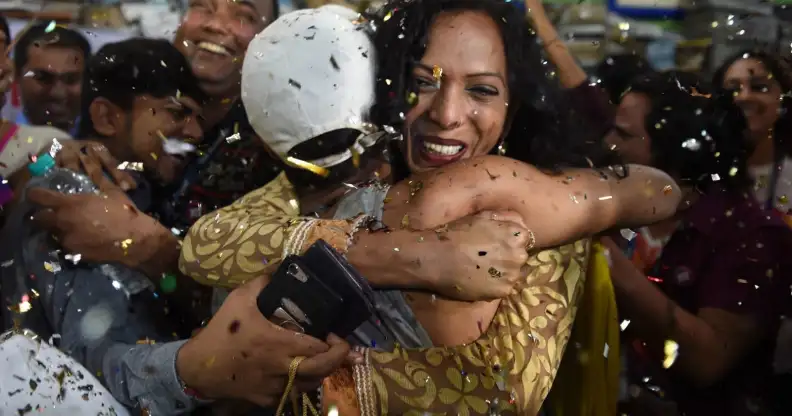India may have legalised gay sex. But ‘paralysing fear’ plagues Bangladesh’s LGBT community

The Supreme Court’s decision was unanimous. (INDRANIL MUKHERJEE/AFP/Getty)
When the five judges who sit on India’s Supreme Court unanimously voted to decriminalise homosexuality in September, LGBT+ activists across the world rejoiced—with photos of jubilant campaigners celebrating the ruling shared on social media.
The court ruling struck down the notorious Section 377, which was introduced under the British Empire in 1861 and made same-sex sexual activity punishable by life imprisonment.
With India entering a new era of equality, the situation for LGBT+ people in neighbouring Bangladesh is coming under increasing scrutiny.
Similarly to India, homosexuality has been illegal in Bangladesh since the introduction of Section 377 of the Penal Code, when the country was under the rule of the British Indian Government, and is punishable with up to life in prison.
Although the country legally recognised transgender people (known as hijras in South Asia) as a third gender in 2013, these individuals still face large amounts of discrimination—despite having been part of Bangladeshi culture since the Karma Sutra period between 400 BC and 200 AD. There is also no government guidance on how trans people should legally change their gender on official documents.
The Bangladeshi government has twice rejected recommendations in the United Nations’ human rights reviews to repeal Section 377—in 2009 and 2013. “Sexual orientation is not an issue in Bangladesh,” the government said in 2009.

Indians celebrate the legalisation of gay sex. (Sajjad Hussain/AFP/Getty)
One prominent LGBT+ activist in Bangladesh, Ruhel*—whose name has been changed because he fears government reprisal for speaking out—tells PinkNews that attitudes in the country, where more than 90 percent of the population is Muslim, are extremely socially conservative.
“Like any Muslim-majority conservative country, the battle against Section 377 is a lot harder in comparison to countries which are not,” says Ruhel.
He explains how, although there are no reported cases of people being convicted under Section 377, this code has been used by law enforcement agencies to “harass, extort, violate and discriminate against hijra [transgender], kothi [effeminate men] and LGBTQ-identified communities.”
In 2016, the international queer community was shaken when Xulhaz Mannan, the founder of Roopbaan, the country’s first LGBT+ magazine, and its general secretary Mahbub Rabbi Tonoy, were hacked to death with machetes.

Xulhaz Mannan at a Bengali New Year rally in 2014. (STR/AFP/Getty)
The pair were killed in Mannan’s flat in Dhaka, with Al-Qaeda in the Indian Subcontinent (AQIS) claiming responsibility for the murders. According to Amnesty International, despite evidence including CCTV footage and eye witness testimonies, nobody has ever been charged for the murders.
Ruhel explains that, following the deaths of Mannan and Tonoy, the LGBT+ community in Bangladesh has “undergone a period of paralysing shock and fear.”
Since the deaths, he says, dozens of LGBT+ rights campaigners have fled the country in fear of their safety.
And, the persecution of LGBT+ people by Bangladeshi authorities has continued.
In May 2017, the country’s notorious Rapid Action Battalion (RAB) raided a “gay party” in Dhaka, arresting 28 men and accusing them of homosexuality.
And, in January 2018, in a report on the plight of trans men in the country, the Human Rights Campaign said that LGBT+ people in Bangladesh “face a climate of hostility.”
Roopbaan, meanwhile, ceased publication after Mannan and Tonoy’s deaths.
As well as Section 377, Ruhel explains that the country’s authorities are known to use other laws—including Section 54 of Criminal Procedure Code and Section 74 of Dhaka Metropolitan Police Ordinance—disproportionately against gender and sexual minorities.
He adds that Section 57 of the Information and Telecommunication (ICT) Act, and the government’s proposed Digital Security Act, also threaten the Bangladeshi LGBT+ community’s freedom of expression, while newspapers in the country are strongly discouraged from publishing any LGBT+ content.
Bangladesh’s repressive laws, the activist explains, have also “significantly hampered” work to prevent HIV/AIDS in the country and “curtailed these vulnerable groups’ access to health.”
While Ruhel says that some young people in Bangladesh are beginning to discuss LGBT+ issues, he stresses that the bulk of the population is against the queer community.

LGBT+ activists at a Pride event in Delhi, India. (Sajjad Hussain/AFP/Getty)
“Today, we are seeing more and more people in the new generation opening up to idea of gender and sexual fluidity,” he continues “Despite this, there is still a lot of hate and ignorance among the general mass not only in terms of homosexuality but sexuality and sexual health in general. It will still be a long time until homosexuality is legalised in Bangladesh.”
Another LGBT+ rights campaigner, Salim*, who also did not want to reveal his real name amid safety concerns, paints a similar picture of life for queer people in Bangladesh.
Salim tells PinkNews that more young people are discussing issues around sexuality and gender identity, but that the view of the general population remains staunchly conservative.
“Especially young people are talking quite a lot about it nowadays,” he tells PinkNews. “However, the socio-political climate in Bangladesh is different and I’m not sure when the environment will be created to publicly talk about this…[LGBT+ people] are continuously being discriminated against.”
He continues: “Religion is one of the strong driving forces in Bangladesh. It is a great obstacle in the way of decriminalising homosexuality.”
Still, Salim remains optimistic about the future. He believes that, eventually, homosexuality could be legalised in Bangladesh.
“It is quite a time-consuming process, but it’s not totally impossible,” he says. “Within the next 10 to 15 years we may see some positive changes.”
* Names have been changed to protect the identity of the campaigners quoted.

